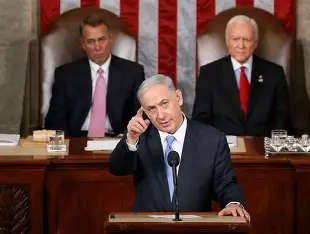Dozens of diplomats and delegates staged a walkout at the United Nations General Assembly on Thursday as Israeli Prime Minister Benjamin Netanyahu took the podium, underscoring the deep divisions his government faces on the world stage amid the ongoing Gaza conflict.
As Netanyahu began his address in New York, representatives from Arab nations, along with several Latin American and African delegations, stood and left the chamber in a coordinated protest. The move, carefully choreographed in advance, was intended to signal rejection of Israel’s military campaign in Gaza and Netanyahu’s recent comments opposing international recognition of Palestinian statehood.
The protest left visibly empty seats across the assembly hall, even as Netanyahu pressed on with his remarks. Some European envoys remained in their places but refrained from applause, while a handful of countries allied with Israel, including the United States and Hungary, sat attentively throughout his speech.
Speaking over the exodus, Netanyahu defended his government’s handling of the war, insisting Israel was acting within its rights to defend itself against “relentless terror.” He accused Hamas of deliberately prolonging civilian suffering and criticized the International Criminal Court for what he called “one-sided” investigations into Israeli actions.
“This is a war we did not seek, but one we will finish,” Netanyahu declared, insisting Israel would not bow to international pressure or what he described as “political theater.”
The mass walkout highlighted just how strained Israel’s diplomatic relationships have become in the aftermath of months of bloodshed in Gaza. According to UN officials, more than 30 delegations either left the chamber or chose not to attend the session altogether once Netanyahu’s appearance was confirmed.
Palestinian representatives praised the protest, with Ambassador Riyad Mansour calling it a “powerful reminder that Netanyahu does not speak for the world, nor for peace.” He added that the visible rejection of Israel’s narrative on the UN floor was “a moral stance against occupation and injustice.”
Western officials, however, were more cautious. A senior European diplomat told reporters the protest was “symbolic but not constructive,” arguing that dialogue — however difficult — remains necessary. Still, the diplomat acknowledged that patience with Netanyahu’s government has worn thin across many capitals.
Inside Israel, the walkout quickly became a political talking point. Netanyahu’s allies framed the moment as evidence of bias against Israel within the UN, while critics at home suggested it showed how isolated the country has become under his leadership. Opposition leader Yair Lapid said the empty seats reflected “a dangerous erosion of Israel’s standing in the world.”
The United Nations has been a contentious venue for Israel for decades, but this year’s General Assembly is unfolding against an especially volatile backdrop. Several countries, including the UK, France, and Australia, have recently recognized Palestine as a state, a move Netanyahu has condemned as undermining peace efforts.
Netanyahu’s critics argue that his continued rejection of Palestinian sovereignty is not only politically untenable but also diplomatically isolating. The walkout, they say, could be a prelude to broader international pressure, including sanctions or recognition of Palestinian claims in international courts.
In his address, Netanyahu attempted to pivot toward Iran, warning of Tehran’s growing influence in the region and urging world powers to confront what he described as “the real engine of instability.” Yet the departure of so many delegates ensured that his message reached a far smaller audience inside the hall.
For many observers, the spectacle symbolized a turning point. Aaron David Miller, a veteran U.S. negotiator, said the walkout underscored “a sense that Netanyahu’s narrative no longer carries weight in much of the world,” adding that the incident would reverberate in diplomatic corridors well beyond New York.
As the General Assembly continues, attention will shift to whether other leaders use their speeches to amplify criticism of Israel or to attempt to broker renewed calls for ceasefire. With no resolution in sight, the tension on display during Netanyahu’s address reflects the broader diplomatic deadlock.
For now, the image of diplomats rising in unison and leaving the chamber is likely to linger — a stark illustration of just how contested Israel’s position has become in international forums.



